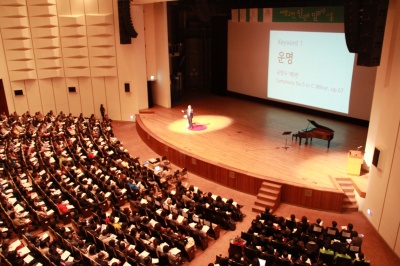
The scene describes some moments during humanities lectures held every Tuesday at the University Cultural Center in Seoul National University (SNU).
The program titled “Western Classics, Tell about Human Beings” was organized primarily for those who wish to find true nature of human beings and themselves by discussing or reading 12 Western classics in total with the nations’ most prominent scholars.
For 2013, Seoul National University Library and Foundation Academia Platonica cooperated to host the event.
Twelve lectures in total are planned, including “Visit Greece, the origins of classics” by professor Kim Sang-geun (Yonsei University, Theology) and “Death” by Shelly Kagan, a Yale University professor. With its initiation on March 26, “Western Classics, Tell about Human Beings” will continue until June 18. The works vary from Dante Aligheri’s “La Divina Comedia” and Rene Descartes’ “Meditations on First Philosophy” to Friedrich Nietzsche’s “Thus Spoke Zarathustra”.
“Beethoven, the Freedom Dreamer and the Solitary Snob” by professor Hong Seong-chan (Korean National University of Arts), the most recent lecture held on April 9, further enhanced the audience’s understanding of the composer and his music by incorporating live piano and violin performances on stage.
“The fact that professors connect seemingly unrelated topics to humanities was eye opening,” said Lee Ji-yeon, a participant. “The performances grasped my attention until the very end.”
Three of the scheduled lectures had already been held, receiving positive remarks.
“The reviews participants have been sending through e-mail have showed they were very satisfied with the quality of the lectures,” said Park Yu-kyung, a researcher at Foundation Academia Platonica. “Approximately 92.4 percent of the participants expressed satisfaction.”
Although the program had just begun, it proved successful with many attending and registering for the majority of the scheduled lectures.
“Last year, when the program was held in Yonsei University, 100 participants attended all 14 lectures,” Park said. “Although the accurate number of consistent attendees for this year cannot be drawn yet, numerous participants have registered for multiple lectures.”
Not only the students and staff members of SNU but also others over the age of 18 can attend the lectures for free. Despite the differences in age, they obtain a communal experience during the two-hour long lectures.
For those who sustain routine lives, the particular experience holds much meaning.
“I had such a great time attending the lecture,” said Eun Hye, a middle-aged participant. “It was an oasis to my bland everyday life.”
Foundation Academia Platonica plans to further enrich the public’s knowledge on humanities with various topics in the future.
“We have been putting much effort into spread humanities through programs, including “Reading on Saturdays”, a reading program for high school students and “I love in”, one in cooperation with the media,” Park said. “We will continue to organize more programs under different themes.”
Those who wish to visit may apply online. A certificate will be provided for those who attended 10 of the 12 lectures. For further information, visit Foundation Academia Platonica’s homepage (http://www.platonacademy.org/).
Oh Seo-jin
seojinoh@ewhain.net

